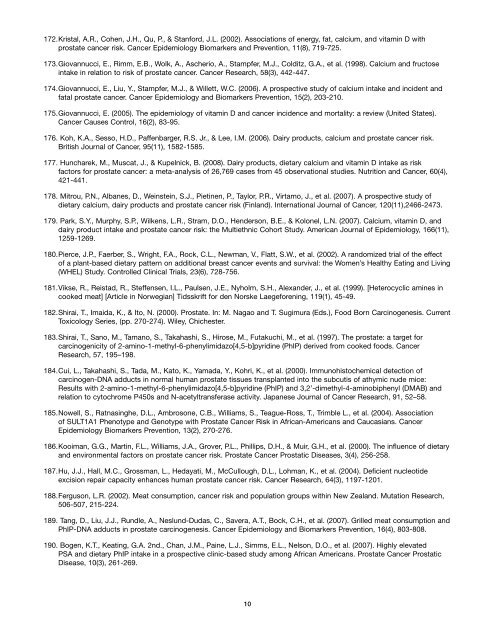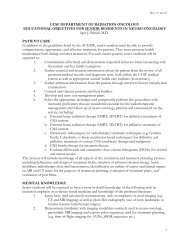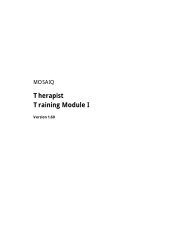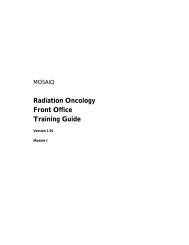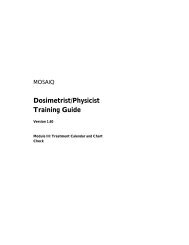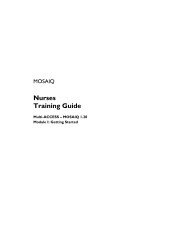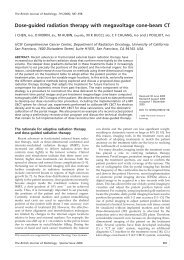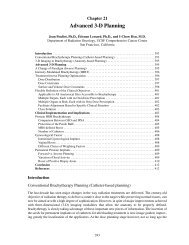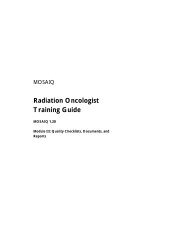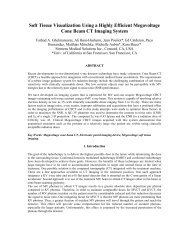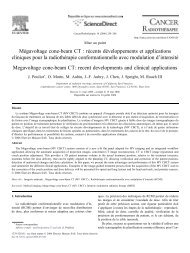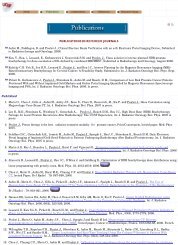Nutrition Prostate Cancer References - UCSF Radiation Oncology
Nutrition Prostate Cancer References - UCSF Radiation Oncology
Nutrition Prostate Cancer References - UCSF Radiation Oncology
You also want an ePaper? Increase the reach of your titles
YUMPU automatically turns print PDFs into web optimized ePapers that Google loves.
172. Kristal, A.R., Cohen, J.H., Qu, P., & Stanford, J.L. (2002). Associations of energy, fat, calcium, and vitamin D with<br />
prostate cancer risk. <strong>Cancer</strong> Epidemiology Biomarkers and Prevention, 11(8), 719-725.<br />
173. Giovannucci, E., Rimm, E.B., Wolk, A., Ascherio, A., Stampfer, M.J., Colditz, G.A., et al. (1998). Calcium and fructose<br />
intake in relation to risk of prostate cancer. <strong>Cancer</strong> Research, 58(3), 442-447.<br />
174. Giovannucci, E., Liu, Y., Stampfer, M.J., & Willett, W.C. (2006). A prospective study of calcium intake and incident and<br />
fatal prostate cancer. <strong>Cancer</strong> Epidemiology and Biomarkers Prevention, 15(2), 203-210.<br />
175. Giovannucci, E. (2005). The epidemiology of vitamin D and cancer incidence and mortality: a review (United States).<br />
<strong>Cancer</strong> Causes Control, 16(2), 83-95.<br />
176. Koh, K.A., Sesso, H.D., Paffenbarger, R.S. Jr., & Lee, I.M. (2006). Dairy products, calcium and prostate cancer risk.<br />
British Journal of <strong>Cancer</strong>, 95(11), 1582-1585.<br />
177. Huncharek, M., Muscat, J., & Kupelnick, B. (2008). Dairy products, dietary calcium and vitamin D intake as risk<br />
factors for prostate cancer: a meta-analysis of 26,769 cases from 45 observational studies. <strong>Nutrition</strong> and <strong>Cancer</strong>, 60(4),<br />
421-441.<br />
178. Mitrou, P.N., Albanes, D., Weinstein, S.J., Pietinen, P., Taylor, P.R., Virtamo, J., et al. (2007). A prospective study of<br />
dietary calcium, dairy products and prostate cancer risk (Finland). International Journal of <strong>Cancer</strong>, 120(11),2466-2473.<br />
179. Park, S.Y., Murphy, S.P., Wilkens, L.R., Stram, D.O., Henderson, B.E., & Kolonel, L.N. (2007). Calcium, vitamin D, and<br />
dairy product intake and prostate cancer risk: the Multiethnic Cohort Study. American Journal of Epidemiology, 166(11),<br />
1259-1269.<br />
180. Pierce, J.P., Faerber, S., Wright, F.A., Rock, C.L., Newman, V., Flatt, S.W., et al. (2002). A randomized trial of the effect<br />
of a plant-based dietary pattern on additional breast cancer events and survival: the Women’s Healthy Eating and Living<br />
(WHEL) Study. Controlled Clinical Trials, 23(6), 728-756.<br />
181. Vikse, R., Reistad, R., Steffensen, I.L., Paulsen, J.E., Nyholm, S.H., Alexander, J., et al. (1999). [Heterocyclic amines in<br />
cooked meat] [Article in Norwegian] Tidsskrift for den Norske Laegeforening, 119(1), 45-49.<br />
182. Shirai, T., Imaida, K., & Ito, N. (2000). <strong>Prostate</strong>. In: M. Nagao and T. Sugimura (Eds.), Food Born Carcinogenesis. Current<br />
Toxicology Series, (pp. 270-274). Wiley, Chichester.<br />
183. Shirai, T., Sano, M., Tamano, S., Takahashi, S., Hirose, M., Futakuchi, M., et al. (1997). The prostate: a target for<br />
carcinogenicity of 2-amino-1-methyl-6-phenylimidazo[4,5-b]pyridine (PhIP) derived from cooked foods. <strong>Cancer</strong><br />
Research, 57, 195–198.<br />
184. Cui, L., Takahashi, S., Tada, M., Kato, K., Yamada, Y., Kohri, K., et al. (2000). Immunohistochemical detection of<br />
carcinogen-DNA adducts in normal human prostate tissues transplanted into the subcutis of athymic nude mice:<br />
Results with 2-amino-1-methyl-6-phenylimidazo[4,5-b]pyridine (PhIP) and 3,2’-dimethyl-4-aminobiphenyl (DMAB) and<br />
relation to cytochrome P450s and N-acetyltransferase activity. Japanese Journal of <strong>Cancer</strong> Research, 91, 52–58.<br />
185. Nowell, S., Ratnasinghe, D.L., Ambrosone, C.B., Williams, S., Teague-Ross, T., Trimble L., et al. (2004). Association<br />
of SULT1A1 Phenotype and Genotype with <strong>Prostate</strong> <strong>Cancer</strong> Risk in African-Americans and Caucasians. <strong>Cancer</strong><br />
Epidemiology Biomarkers Prevention, 13(2), 270-276.<br />
186. Kooiman, G.G., Martin, F.L., Williams, J.A., Grover, P.L., Phillips, D.H., & Muir, G.H., et al. (2000). The influence of dietary<br />
and environmental factors on prostate cancer risk. <strong>Prostate</strong> <strong>Cancer</strong> Prostatic Diseases, 3(4), 256-258.<br />
187. Hu, J.J., Hall, M.C., Grossman, L., Hedayati, M., McCullough, D.L., Lohman, K., et al. (2004). Deficient nucleotide<br />
excision repair capacity enhances human prostate cancer risk. <strong>Cancer</strong> Research, 64(3), 1197-1201.<br />
188. Ferguson, L.R. (2002). Meat consumption, cancer risk and population groups within New Zealand. Mutation Research,<br />
506-507, 215-224.<br />
189. Tang, D., Liu, J.J., Rundle, A., Neslund-Dudas, C., Savera, A.T., Bock, C.H., et al. (2007). Grilled meat consumption and<br />
PhIP-DNA adducts in prostate carcinogenesis. <strong>Cancer</strong> Epidemiology and Biomarkers Prevention, 16(4), 803-808.<br />
190. Bogen, K.T., Keating, G.A. 2nd., Chan, J.M., Paine, L.J., Simms, E.L., Nelson, D.O., et al. (2007). Highly elevated<br />
PSA and dietary PhIP intake in a prospective clinic-based study among African Americans. <strong>Prostate</strong> <strong>Cancer</strong> Prostatic<br />
Disease, 10(3), 261-269.<br />
10


